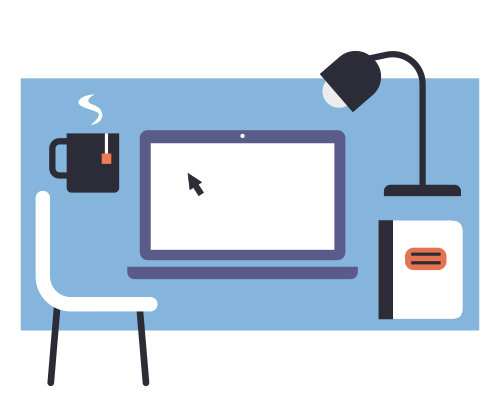Blog
Staying Healthy and Productive While Studying Online
on June 14, 2021

People are transitioning to online learning for a number of different reasons. Whether it’s because of the growing ease of access to digital resources, the convenience and flexibility of learning from home, or because of a seismic industry shift to e-learning due to the coronavirus, more people than ever are turning to their laptops and the internet to get a comprehensive education.
While distance learning and online learning have its advantages, it’s not without its challenges. It’s these challenges that we’ll take a look at below, including some tips on how to work around them and help you study effectively.
Staying focused and avoiding distractions
Between Youtube, Spotify, Wikipedia, Facebook, Twitter, Instagram, and most infamously Netflix, there’s no shortage of apps and websites competing for your precious attention while you try to learn. Just opening your laptop without checking your social media accounts can sometimes be a task in and of itself.
To bypass these attention-hungry apps and maintain laser focus, you can try:
- Removing or disabling apps from your study devices
- Turning off notifications for social media and other apps
Studying at different times of the day
Studying from home also provides you with flexibility that you would never have with physical lessons. Because of this, you’re not bound by traditional studying hours; you’re free to learn throughout the day, whenever you find it most effective. Many people discover that they aren’t morning learners, and do their best learning at midday or even at night. Take advantage of this flexibility to find out which period of the day is most conducive to effective studying for you personally.
Creating a dedicated study space
While it might feel good laying in bed with your laptop, it’s not good for your concentration or your physical health. Having a dedicated study workspace will increase your focus and train your brain to associate that space with studying, habitualizing the act of sitting down to learn. You don’t need an entire office for this; a small desk in the corner of your room dedicated only to work and study is more than enough.
To make sure that your workspace is as efficient and productive as possible you should have:
- A desk big enough for your laptop and other textbooks
- A comfortable chair with back support that can be adjusted so your hands are at the ergonomic angles to prevent repetitive strain injuries
- Sufficient lighting to minimize eye strain and help you see all of your study material clearly
Separating your work from leisure spaces will also help you switch off and relax more fully when you’re done for the day.
Connecting with students and staff
One of the joys of going to school or campus is interacting with fellow students and faculty members. Studying from home provides fewer opportunities for this to happen in person, but there are still many ways to connect and communicate with students, tutors, and other staff thanks to technology like Skype and Zoom, and various social media.
Study forums and social media groups also offer a number of opportunities for collaboration and communication with other students. Whether this happens through Slack, Discord, Reddit, or your school’s own personal forums, the opportunity to connect is always there.
Looking after your physical and mental health
While the flexibility of studying from home can be used to build healthy routines, it can also make it easy to fall into bad habits. It’s important to prioritize looking after both your physical and mental health during this time. A few ways of doing this include:
- Going outside and taking breaks regularly
- Exercising consistently and eating a healthy diet
- Establishing boundaries between work and leisure time
- Seeing friends and loved ones
All of these steps in conjunction will have a positive cascading effect on your study habits, allowing you to be more productive and focused while studying at home.
